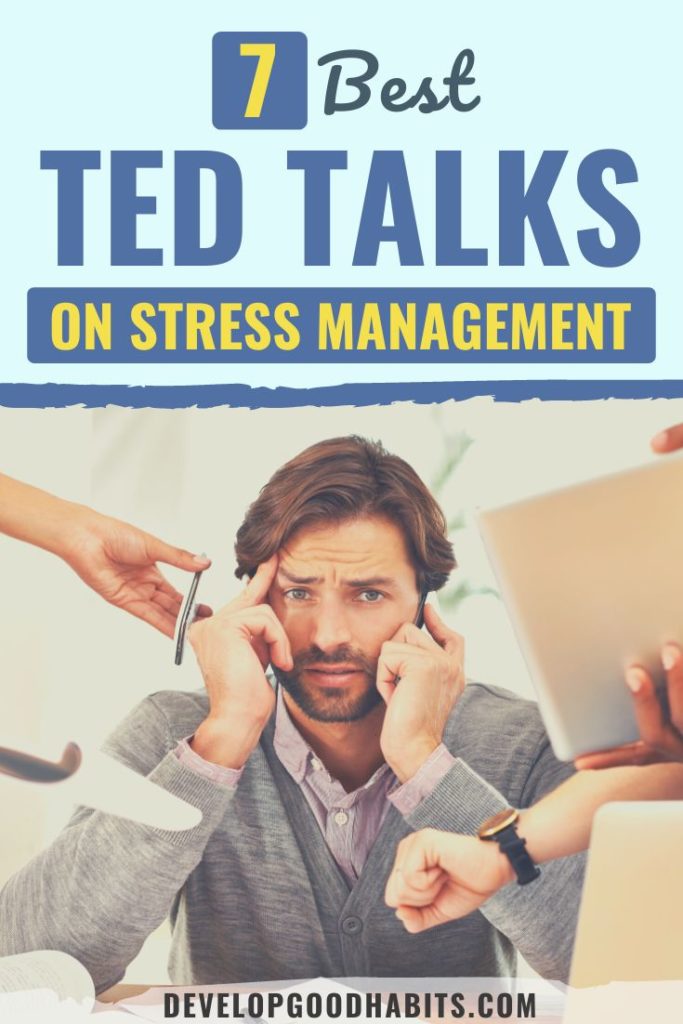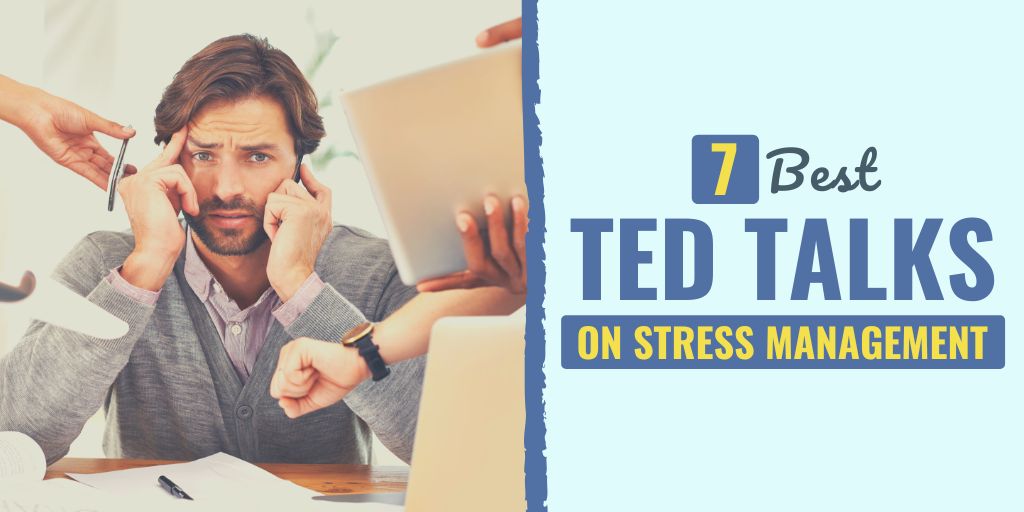Modern life is stressful—so stressful that learning how to manage your stress has become a necessary life skill.
If you’re interested in learning new ways to cope with everyday stressors, the following TED talks on stress can help you. Not only will these best TED talks about stress share strategies for dealing with stress, but they will also dig deeper and reveal the oftentimes negative effects of stress on your brain and behavior.
(Side note: Another positive way to improve your life is to read and learn something new every day. A great tool to do this is to join over 1 million others and start your day with the latest FREE, informative news from this website.)
7 Best TED Talks About Stress Management
1. How to make stress your friend by Kelly McGonigal
In this TED talk, health psychologist Kelly McGonigal makes a strong argument for the detrimental effects of perceiving stress as a negative thing. In fact, changing your attitude about stress from negative to positive can help increase your long-term health.
Through her research, McGonigal has discovered that people who believe that stress is bad for them have a higher mortality rate than those who see stress as a healthy physiological response to an external factor. People who recognize that stress is their body's way of preparing them for what is about to come are able to keep their blood vessels relaxed and reduce their chances of suffering a stroke or heart attack.
McGonigal teaches her audience that stress can make people social because it releases oxytocin in the brain, which is the same hormone that gets released during loving physical contact such as a hug. This neurohormone also fine-tunes the brain's social instincts and motivates people to seek social support and be more empathetic with other people.
Oxytocin also helps heart cells regenerate, and the physical benefits of this hormone are enhanced by the social contact that it encourages. Research has shown that stress increases one's risk of dying by 30%, but people who have a sufficient amount of social interaction do not experience this increase in mortality. This shows that caring creates resilience, and it is beneficial for people's physical health to learn how to be better at coping with stress.
It is not inevitable to have harmful side effects of stress. The way you choose to think and act can change how your body responds to this common feeling. As Kelly McGonigal says, “When you change your mind about stress, you can change your body's response to stress.”
2. How to stay calm when you know you'll be stressed by Daniel Levitin
Daniel Levitin begins this talk with a personal story recounting his experience with losing personal items like passports and keys. He uses this as an example of when it is a good time to think in a pre-mortem way, which means thinking ahead of time about any possible disasters that could go wrong, and putting systems into place to prevent these things from happening, or to lessen their effects.
Levitin also gives a larger-scale example of this that most everyone can relate to. According to him, every drug on the market has a “number needed to treat.” This is the number of people who have to take a drug before just one person is impacted by it. He provides the data for the most popular statin to prove his point, saying that 300 people must take this drug in order for one person to gain the benefits from it. But side effects occur in 5% of the people who take it. This means that you are 15 times more likely to be hurt by a drug than to be helped.
By using pre-mortem thinking, you would ask the doctor the “number needed to treat” before taking any medication so you can weigh the pros and cons before deciding whether you want to take it or not. This would help you prepare for both the best- and worst-case scenarios.
3. Your body language shapes who you are by Amy Cuddy
Amy Cuddy, a social psychologist, shares with her audience a simple way for anyone to change other people's perceptions of them, as well as improve how people feel about themselves. She argues that nonverbals like body language are the first opportunity people have to judge others, and this often has an actual impact on the outcome of the relationship between two people.
If you can spend some time “power posing” every day with your arms or elbows out, your chin up, and your posture open, you will be asserting a dominant stance that can actually increase your testosterone by 20% and decrease your cortisol by 25%. Adopting these powerful postures can make you feel more powerful.
In addition to demonstrating dominance, people must also show that they are compassionate and warm toward other people. Cuddy explains that it is important to build trust with other people before trying to show your power. If you can show people that you understand and can relate to them. You're building trust, which will open people up to hearing your ideas.
Nonverbally displaying power shouldn't be used to intimidate people. Of course, you don't want to slouch or make yourself small, but don't make yourself look so physically large that you are undermining the trust you are trying to build with people. Try to give nonverbal signals of warmth so you can come across as being strong without also seeming over-aggressive.
4. Agile programming—for your family by Bruce Feiler
This TED talk by Bruce Feiler addresses how both businesses and families can work in a way that allows them to be more relaxed and get more accomplished.
He has found through research that out of everything that children want for their parents, they want them to be less tired and less stressed the most. By practicing agile development and doing small things in chunks, Feiler has found that this is possible.
Feiler urges his listeners to make their groups and teams work effectively by letting them manage themselves through small tasks. Leadership has to be constantly adapting to help empower their children (or employees) to make their own decisions and have an active part of their own upbringing. It is important to let children succeed and fail on their own terms.
This helps manage stress if groups are able to focus on their strengths and the things they are doing right rather than their weaknesses. It is also important to tell your story to your children so they feel like they are part of a bigger picture, and they know how the family or group has overcome failures in the past.
Finally, Feiler makes the point that happiness is not something you find—it is something you make. Similarly, greatness is not a matter of circumstances—it's a matter of choice.
5. The gift and power of emotional courage by Susan David
In this TED talk, Susan David challenges our culture that prefers false positivity over true emotions. She talks about the fact that how people choose to deal with their emotions shapes everything about their lives, including their actions, their careers, their relationships, their health, and their happiness.
Emotions are seen as being either good or bad, and positive emotions are deemed correct. Because of this, people lockdown on their false positive emotions and become rigid in their thinking. People are often told to stop being angry, or those who are sick are told to think positively. But depression affects more people than any other illness worldwide.
When emotions are ignored, they grow stronger. It is important to not only learn to accept your emotions but also to accurately label them so you know what you must do to fix the problem. People must be open with their difficult emotions to help pave the way to their best selves.
This is what emotional agility is all about—being able to be with your emotions and have compassion and courage for yourself. The only certain thing in our fragile lives is uncertainty, so having emotional agility is paramount to the ability to walk with fear.
In this talk, David makes the strong argument that if you have emotional agility—or emotion courage—you will be more equipped to handle the stressors that life sends your way. Instead of ignoring the negative things that come up, embrace them and deal with them so you can move on.
6. There's no shame in taking care of your mental health by Sangu Delle
In this TED Talk, presented in Lagos, Nigeria, Sangu Delle reveals how our personal and cultural beliefs can prevent us from taking care of our mental health. Delle shares anecdotes from his personal experience as a Ghanaian man raised in a culture of male stoicism and with great fear of addressing mental health issues.
Although taking care of one’s mental health is now considered an essential part of achieving overall good health, many people still struggle to overcome the fear and stigma associated with mental illness. This fear has been ingrained in them through the society or culture they grew up in. Many of these societies look down on displays of vulnerability in the male members of their group, considering them to be weak.
Delle was raised in a society that values male stoicism. His statement “(W)e African men neither process nor express our emotions. We deal with our problems” was met with applause from the TED Talk audience.
In societies such as this, very little is done to help people with mental illnesses. People with mental health issues are viewed with fear and treated with ridicule or cruelty. The causes of mental illness are often attributed to demonic possessions or the work of village witches. Causes such as anxiety, depression, stress, and the loss of a loved one are hardly ever acknowledged.
Delle reminds his audience that taking care of one’s mental health is important. He encourages them to tell someone about how they’re feeling. He reminds them that talking about their feelings doesn’t make one weak. Instead, it’s what makes us all human.
7. The habits of happiness by Matthieu Ricard
In this TED Talk, former biochemist turned Buddhist monk Matthieu Ricard discusses happiness, shows examples of what happiness looks like, and gives examples of how to achieve true, lasting happiness, regardless of one’s emotional or physiological state.
Although a number of philosophers and scholars throughout history have declared that happiness is not as important as finding one’s passion and experiencing the rollercoaster ride called life, nobody actively seeks out suffering. Ricard proposes that humans have a deep longing for happiness.
In this talk, Ricard gives a comparison between pleasure and happiness. The former is objective and largely dependent on time, location, and the object of pleasure. Meanwhile, happiness is compared to a deep ocean, where the condition of the water’s surface—whether it’s storm-tossed or calm—does not affect the underwater condition.
According to Ricard, the way to achieve happiness is through meditation, which trains the mind to perceive things in a new way. The mind is taught to focus on positive things rather than negative ones.
His talk is a reminder that well-being is achieved by practicing habits that cultivate compassion and loving kindness.
Other TED Talks You May Enjoy
Final Thoughts
Hopefully, these TED talks will help you look at stress differently and deal with it more effectively, so you (and your family) can avoid the negative emotional and physical tolls that are caused by unchecked stress.
I recommend that you review the videos, take notes, and try out at least one suggestion by the speakers. And if you need more stress management ideas, check out these 19 strategies for dealing with stress.
Finally, if you want another positive way to improve your life, then read and learn something new every day. A great tool to do this is to join over 1 million others and start your day with the latest FREE, informative news from this website.


